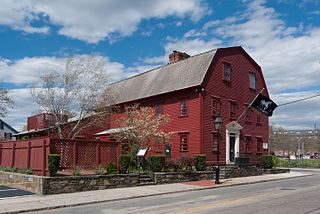Related Research Articles

Paulina Wright Davis was an American abolitionist, suffragist, and educator. She was one of the founders of the New England Woman Suffrage Association.
Ann Smith Franklin was an American colonial newspaper printer and publisher. She inherited the business from her husband, James Franklin, brother of Benjamin Franklin. She published the Newport Mercury, printed an almanac series, and printed Rhode Island paper currency. She was the country’s first female newspaper editor, the first woman to write an almanac, and the first woman inducted into the University of Rhode Island's Journalism Hall of Fame.

The history of Rhode Island is an overview of the Colony of Rhode Island and Providence Plantations and the state of Rhode Island from pre-colonial times to the present.

George Alvin Wiley was an American chemist and civil rights leader. He was a founder of the National Welfare Rights Organization.

Charles Walter Stetson was an American artist often described as a "colorist" for his rich use of color.

Elizabeth Buffum Chace was an American activist in the anti-slavery, women's rights, and prison reform movements of the mid-to-late 19th century.
William Wiley may refer to:

George Champlin Mason Sr. (1820-1894) was an American architect who built a number of mansions in Newport, Rhode Island, during the Gilded Age. He helped to found the Newport Historical Society as well.

James Sullivan Lincoln was an American portrait painter based in Providence, Rhode Island. He has been called the "father of Rhode Island art" and the "father of art in Providence". His works include eleven portraits of governors of Rhode Island, displayed at the State House, and six portraits of mayors which hang in the Providence City Hall.

Sarah James Eddy was an American artist and photographer who specialized in the platinotype process, also known as platinum prints. She was active in abolition, reform, and suffragist movements, and was a philanthropist as well as instrumental in the founding of the Rhode Island Humane Society. She was inducted into the Rhode Island Heritage Hall of Fame in 2017.

Antoinette Forrester Downing was an American architectural historian and preservationist who wrote the standard reference work on historical houses in Rhode Island. She is credited with spearheading a movement that saved many of Providence's historic buildings from demolition in the mid 20th century and for her leadership was inducted into the Rhode Island Heritage Hall of Fame in 1978.

George T. Downing was an abolitionist and activist for African-American civil rights while building a successful career as a restaurateur in New York City; Newport, Rhode Island; and Washington, D.C. His father had been an oyster seller and caterer in Philadelphia and New York City, building a business that attracted wealthy white clients. From the 1830s until the end of slavery, Downing was active in the Underground Railroad, using his restaurant as a rest station for refugees on the move. He built a summer season business in Newport, and made it his home. For more than 10 years, he worked to integrate Rhode Island public schools. During the American Civil War (1861–1865), Downing helped recruit African-American soldiers.
John Collins Quinn was an American journalist and the former president of Gannett Company, and former editor-in-chief of USA Today.
Sarah Updike Goddard was an early American printer, as well as a co-founder and publisher of the Providence Gazette and Country Journal, the first newspaper founded in Providence, Rhode Island. She worked closely with her son William and daughter Mary Katherine, who both also became printers and publishers, forming one of the earliest influential publishing dynasties in the American colonies.
Margaret F. Ackroyd was a civil servant from Providence, Rhode Island. Ackroyd was named the Providence Journal's Man of the Year in 1971, and she was inducted into the Rhode Island Heritage Hall of Fame in 1972.
Olive F. Wiley was an African American civil rights activist and education administrator born in Warwick, Rhode Island. Wiley was a founder and president of the Mt. Hope Day Care. She met her husband William Wiley (editor), in Providence, Rhode Island in 1921, and they were married in 1925.
Andrew J. Bell Jr., was an African American business owner, a funeral director, a community leader, and a civil rights activist. Bell was posthumously inducted into the Rhode Island Heritage Hall of Fame in 2007.

Mahlon Van Horne was an American minister, state legislator, and diplomat from Rhode Island. He served as pastor of the Union Colored Congregational Church in Newport, Rhode Island from 1869 to 1898. He served three terms in the Rhode Island General Assembly from 1885 to 1889, becoming the first African American to serve in the state legislature. In 1896, President William McKinley appointed him U.S. Consul to the Danish West Indies at Saint Thomas, where he served until 1903.
References
- ↑ Kotz, Nick. (1977). A passion for equality: George A. Wiley and the movement . Kotz, Mary Lynn (1st ed.). New York: Norton. ISBN 0393075176. OCLC 2966889.
- ↑ "Olive F. Wiley". Riverside, Rhode Island: Rhode Island Heritage Hall of Fame. Archived from the original on 27 December 2015. Retrieved 27 December 2015.